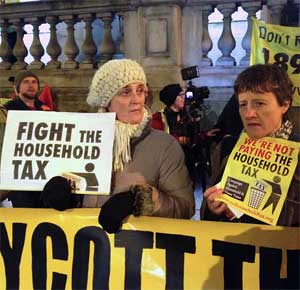Over 30 years of anarchist writing from Ireland listed under hundreds of topics
Household tax & Water Tax must be defeated
 WSM policy in opposition to the Household & Water Tax and how we think the campaign in opposition to it must be built.
WSM policy in opposition to the Household & Water Tax and how we think the campaign in opposition to it must be built.
1. The household tax is simply another attempt to place the burden of the financial crisis on the shoulders of ordinary workers.
2. The €100 charge is designed to pave the way for a combined property and water tax which will amount to over €1,000 per household for the average household by 2014.
3. Attempts by proponents of these new taxes to portray a property tax as ‘fair’ or ‘progressive’ and a water tax as environmentally friendly are completely nonsensical.
4. This will simply be a home tax. A real property tax would be levied on the wealth and assets of the wealthiest sections of society and would be geared at making sure that those who own real wealth would be forced to pay more taxes.
5. The property tax does not ‘widen the tax base’ as has been claimed by its proponents. Ordinary workers only have one source of income – that which we get from our work so this is another form of income tax which it is hoped to extract from us. Unlike the wealthy sections of society we do not have alternative sources of income such as dividends, rents etc.
6. The water tax is simply designed to pave the way for privatisation of the water supply – just as has already happened with the bin tax.
7. The household tax is the first step towards implementation of these wider taxes and must be opposed. The registration process for the household tax is designed to build up the database needed for the introduction of the property and water taxes.
8. Opposition to the household tax is important also because it provides a focus around which opposition to the financial policies of the government can be mobilised. This issue can provide an opportunity for people to begin to resist the programme of austerity and attacks on our living standards.
9. The only way in which these taxes can be defeated is through a campaign of mass non-payment. The first step towards non-payment is a refusal to register. The WSM supports the establishment and building of a broad campaign based on non-payment and non-registration.
10. We believe the campaign must be built at a local level in an open and democratic manner. The initial steering committees – at Dublin and at national level – have of necessity been comprised for the most part of representatives of political organisations.
11. We believe it should be a priority to establish real local campaigns in as many areas as possible and that the steering committees should move as soon as possible to being comprised of delegates from the local campaigns.
12. The household tax can be defeated but to organise its defeat will require a huge campaign which encourages people who have never been involved in politics before not just to refuse to pay this tax but also to become organisers i.e to encourage their friends, workmates and neighbours to join the ‘don’t register, don’t pay’ cause..
13. WSM will make this campaign our major organisational priority for the next couple of months. We hope through this to contribute to building a campaign at local and national levels which will successfully defeat this tax and will also give people the political confidence to realise that by organising together we can change the shape of society.
14. That WSM produce €500 of stickers advertising the CAWHT Hotline number with the slogan 'Household Tax - Don't Register Don't Pay. Campaign Hotline 1890 989800' That these stickers be done in the colours of the campaign (black on yellow) and made generally available to campaign activists in any area.
As agreed as January 2012 Delegate Council
Motion passed by Spring 2012 National Conference:
We will continue to prioritise the anti household tax campaign as the main focus for our political activity over the coming months.
At both local and national level within the campaign we will continue to work to ensure that the campaign is organised along structures which will allow for maximum democratic participation.
To this end, at its first meeting after Conference each branch will nominate 2 members to an editorial group which will be tasked with the production of a leaflet/newsletter aimed at campaign activists and which explains what we mean by participatory democracy in the context of how the campaign organises and develops. This leaflet/newsletter will be published by the Dublin anarchist bookfair

